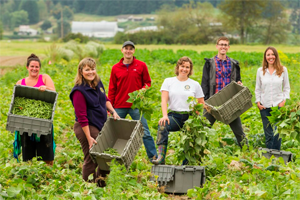Rotary First Harvest: adapting to new bylaws
Guest post by Laura Peirano, 2012-2013 Board Fellow
The Consulting & Business Development Center’s Board Fellows Program places Foster MBA and Evans School MPA students as non-voting board members of local nonprofit organizations. Nonprofit agencies participating in the program reach diverse communities with different passions and interests.
At the annual Net Impact conference in Portland in fall of 2011, I met Benjamin Rasmus who works for the nonprofit Rotary First Harvest (RFH). RFH locates surplus produce, coordinates the harvesting, packaging, and distribution of it in order to solve two problems: leftover crops that go to waste and hungry Americans in need of nutrition. I’m very passionate about nutritious food and the food system in America, so I asked Benjamin if RFH would want to partner with the UW Board Fellows Program. We had a group meeting and decided it was a great fit and I became the Board Fellow.
 As a Board Fellow for Rotary First Harvest, I attended RFH’s strategic planning meeting in September along with many RFH Board of Directors meetings from May 2012 to May 2013. As part of the UW Foster School of Business Board Fellows 2012-2013 Nonprofit Board Leadership Seminar, I also attended twelve hours of class sessions during which I learned about nonprofit strategic planning, structural analysis, effective Board governance, and changing Board structures.
As a Board Fellow for Rotary First Harvest, I attended RFH’s strategic planning meeting in September along with many RFH Board of Directors meetings from May 2012 to May 2013. As part of the UW Foster School of Business Board Fellows 2012-2013 Nonprofit Board Leadership Seminar, I also attended twelve hours of class sessions during which I learned about nonprofit strategic planning, structural analysis, effective Board governance, and changing Board structures.
In order to get to know the way RFH works first hand, I volunteered at several work parties to help pack produce at Northwest Harvest and volunteered at the local food bank. The Northwest Harvest facility is clean, with an abundance of volunteers wearing hairnets and gloves, working tirelessly while chatting, laughing and getting to know each other. I was impressed by how easy it seemed to package food for 100,000 meals in four hours.
The University Food Bank receives produce from Northwest Harvest and Food Lifeline, so a portion of the fruits and vegetables there go through RFH on the way. When I volunteered at the University Food Bank, I was able to witness the supply chain in action, as well as the people who are benefitting from this nonprofit’s amazing work. After sorting donated produce and organizing it in the food bank store, I helped check out customers and bag their groceries. It was rewarding to see people who would not have access to this food without the Food Bank picking out their food for the week. Rotary First Harvest plays its part by making sure more of the food available comes from wholesome fruits and vegetables.
There are hundreds of nonprofits in Washington State, and only thirty-six of them were selected to participate in the UW Board Fellows Program. Of all of these strong nonprofits, Rotary First Harvest has one of the highest functioning and successful Boards in the program, which made it difficult to find a topic with problems to solve. Since RFH recently updated its bylaws, I decided to focus on the transition from the old bylaws to the new bylaws and on ways that the transition could be more successful. My recommendations include evaluating the level of Board involvement, using metrics to evaluate Board success, and engaging the Advisory Board.
Rotary First Harvest Board of Directors is a successful, strategic and nimble Board that has identified and taken steps to correct the problems that have arisen. The fact that the bylaws are frequently reviewed and updated shows that the Board is continually looking for ways to improve. I presented my findings and recommendations in May 2013 to the Board of Directors. My recommendations suggest ways that the Board can continue to be successful and even exceed expectations. It was a great experience working with the board, learning how a board functions and how their strategic objectives shape the success of the nonprofit.
